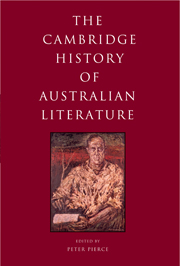Book contents
- Frontmatter
- Introduction
- FROM EUROPEAN IMAGININGS OF AUSTRALIA TO THE END OF THE COLONIAL PERIOD
- FROM THE LATE NINETEENTH CENTURY TO 1950
- 7 Australia’s Australia
- 8 The short story, 1890s to 1950
- 9 Australian drama, 1850–1950
- 10 ‘New words come tripping slowly’: Poetry, popular culture and modernity, 1890–1950
- 11 Australian fiction and the world republic of letters, 1890–1950
- 12 Australia’s England, 1880–1950
- TRAVERSES
- FROM 1950 TO NEARLY NOW
- Select bibliography
- Index
- References
12 - Australia’s England, 1880–1950
from FROM THE LATE NINETEENTH CENTURY TO 1950
Published online by Cambridge University Press: 28 May 2011
- Frontmatter
- Introduction
- FROM EUROPEAN IMAGININGS OF AUSTRALIA TO THE END OF THE COLONIAL PERIOD
- FROM THE LATE NINETEENTH CENTURY TO 1950
- 7 Australia’s Australia
- 8 The short story, 1890s to 1950
- 9 Australian drama, 1850–1950
- 10 ‘New words come tripping slowly’: Poetry, popular culture and modernity, 1890–1950
- 11 Australian fiction and the world republic of letters, 1890–1950
- 12 Australia’s England, 1880–1950
- TRAVERSES
- FROM 1950 TO NEARLY NOW
- Select bibliography
- Index
- References
Summary
Sailing for Eldorado: ‘Home’ in the literary imagination
You’re off away to London now,
Where no one dare ignore you,
With Southern laurels on your brow,
And all the world before you.
On 20 April 1900, hot from the success of his first collections of bush ballads and stories, Henry Lawson took ship for England. His mission: to find new material and markets for his work, to test his mettle in a more challenging milieu, and to stop drinking. He was seen off by a group of Sydney writers, none of whom thought it especially odd that a foremost Australian writer should wish to continue his career half a world away; in fact, many shared his ambition. Armed as he was with encouraging letters from publishers and cuttings of British reviews (‘the antipodean Kipling’ some were calling him), Lawson had reason to feel optimistic. He had dreamed of making the trip for years, and three patrons had had enough confidence in him to pay his family’s fare. Everything seemed to augur well.
And indeed England did treat Lawson quite well. Edward Garnett, the man of letters who also fostered the careers in England of Barbara Baynton and Vance Palmer, was helpful about having a word in the right ear. His long-suffering agent, J. B. Pinker, was tolerant and efficient. Publishers were remarkably generous. At a time when a trained clerk was lucky to get much more than a pound a week, Blackwood paid Lawson more than £60 for three stories.
- Type
- Chapter
- Information
- The Cambridge History of Australian Literature , pp. 255 - 281Publisher: Cambridge University PressPrint publication year: 2009
References
- 3
- Cited by



